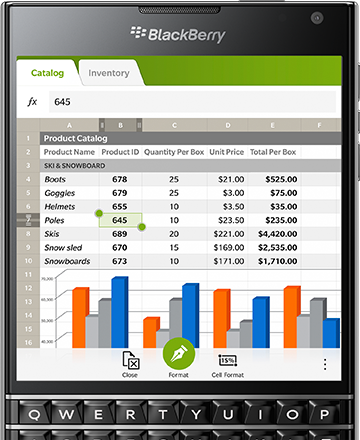Can Blackberry Make a Comeback with The Passport?

:: By Jason Edelman, Fueled ::
Blackberry ruled the pre-smartphone mobile world. Its devices, complete with the now laughably small keyboard, could handle email, surf the Web, and perform other essential functions, making the company a go-to for business people. Now, after years of failure, Blackberry is seeking rebirth, in the form of The Passport.
Sleek and bold, the Passport appears to be a step up from previous models. Old Blackberries were dominated by the keyboard, which often took up more than half of the physicality of the phone. No more. The Passport boasts an impressive square touch screen, and unlike previous attempts at mass appeal, this phone is aimed directly at the 'power professional.' On the marketing side, Blackberry seems to have rediscovered its place. The original phones came about far before constant connection via email and social networks was a necessity for the average person, thus they were effective as a tool for high-powered business people.

The BlackBerry Passport has a large square touch screen.
Many critics of the new design point out that Blackberry is still attempting to relive its glory days. One fact that should clarify this argument: the Passport earned its name because it is as big as the standard passport book. If you have one handy, pick it up. It's a bizarre choice, one that puts the phone in mini-tablet range. Of course, it's not a tablet, so the Passport is stuck at the gate, floating around in limbo: the phablet. It's difficult to hold, and single-handed use is pretty much impossible. While these may sound like minor concerns, they make it virtually impossible to multi-task while using the Passport-and multitasking is an essential part of the power professional's life. Furthermore, in addition to the physical keyboard, an extra four rows of characters pop up on the screen, allowing users to access numbers, shift, and other essential functions. It's can be confusing and at times burdensome. Blackberry seems to have designed the phone to stand out visually, but the accessibility sacrificed along the way is simply too significant to justify the move.
Organization is a bright spot, as is email. Blackberry does nail its business programming, and if you're using the phone to answer and read professional information, it'll do the job. Unlike other smart phones, it fails to deliver on apps, narrowing the possibilities by an incredible amount - meaning businesses won't need to worry about catering to Blackberry users quite yet. Contrasted against the hundreds of thousands of options available to Apple and Android users, Blackberry's customers are still in the dark ages. For example, the are no Google Maps, no Uber, and no Snapchat. The ecosystem remains sorely lacking when compared to those of its main competitors. All said and done, the phone fails to make a convincing argument, and will probably join the other recent iterations of touchscreen Blackberries in the dustbin of tech history.
Jason Edelman is a marketer at Fueled, the leading iPhone app builder in New York City, renowned for its award winning mobile design and strategy.
Subscribe to Our Newsletter!
Latest in Marketing








